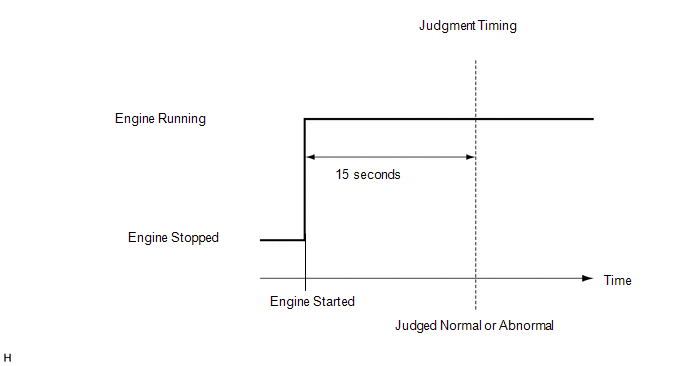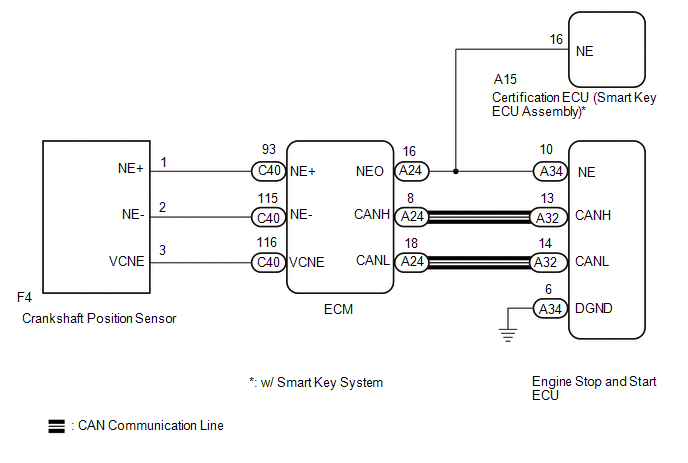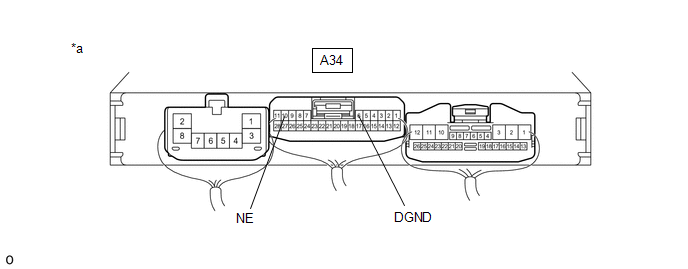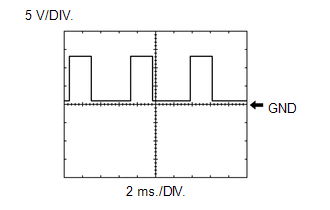| Last Modified: 01-30-2024 | 6.11:8.1.0 | Doc ID: RM100000002EM9Z |
| Model Year Start: 2024 | Model: RAV4 | Prod Date Range: [10/2023 - ] |
| Title: STOP AND START: STOP AND START SYSTEM: P033562; Crankshaft Position Sensor "A" Signal Compare Failure; 2024 MY RAV4 [10/2023 - ] | ||
|
DTC |
P033562 |
Crankshaft Position Sensor "A" Signal Compare Failure |
DESCRIPTION
The crankshaft position sensor sends an engine speed signal (NE signal) to the ECM. The engine speed signal is then sent directly from the NEO terminal of the ECM to the engine stop and start ECU. Additionally, the ECM sends the engine speed to the engine stop and start ECU via CAN communication. The engine stop and start ECU compares the NE signal and engine speed received via CAN communication to check for errors in the NE signal.
If the NE signal is abnormal, the engine stop and start ECU stores DTC P033562.
|
DTC No. |
Detection Item |
DTC Detection Condition |
Trouble Area |
MIL |
Warning Indicate |
Note |
|---|---|---|---|---|---|---|
|
P033562 |
Crankshaft Position Sensor "A" Signal Compare Failure |
All of the following conditions are met for 10 seconds (1 trip detection logic):
|
|
Does not come on |
Does not come on |
SAE Code: P0335 |
CONFIRMATION DRIVING PATTERN
CONFIRMATION AFTER TROUBLESHOOTING
HINT:
-
If the cable is disconnected from the battery terminal, stop and start control is prohibited until refresh charge is completed.
In this case, let the vehicle idle to complete the refresh charge. The refresh charge is complete when the Data List item "Status of Battery Charge Control" changes from "Refresh Charge Mode". (Usually, idling the engine for 5 to 60 minutes with the battery fluid temperature at 11°C (51°F) or higher, the refresh charge will be completed.)
-
If the Techstream is not available and the Data List item "Status of Battery Charge Control" cannot be checked, charge the battery by idling the engine for approximately 5 to 60 minutes or driving the vehicle, and then drive the vehicle and check that stop and start control operates.
If the engine is started with the hood open, the system determines that a jump start has occurred. Therefore, make sure that the hood is closed before starting the engine and driving the vehicle.
- After the refresh charge completes, turn the ignition switch off, wait for at least 30 seconds, and then start the engine again. If the vehicle enters refresh charge mode again while the engine is idling, the initial refresh charge did not properly complete, so wait for the refresh charge to complete.
- Allow the engine to idle for 3 minutes after it is warmed up and check that the engine idle speed is within 50 rpm of the target idle speed.
(a) Connect the Techstream to the DLC3.
(b) Turn the ignition switch to ON.
(c) Turn the Techstream on.
(d) Clear the DTCs.
Powertrain > Stop and Start > Clear DTCs
(e) Start the engine and wait for at least 15 seconds.
(f) Check that DTCs are not output.
Powertrain > Stop and Start > Trouble Codes

STOP AND START SYSTEM OPERATION CHECK
WIRING DIAGRAM

CAUTION / NOTICE / HINT
NOTICE:
- Before replacing the engine stop and start ECU, read the number of starter operations and write it into a new engine stop and start ECU.
- After replacing the engine stop and start ECU or air conditioning amplifier assembly, reset and perform learning of the air conditioning information in the engine stop and start ECU.
- After replacing the engine stop and start ECU or airbag ECU assembly, clear and calibrate the deceleration sensor zero point in the engine stop and start ECU.
- When the engine stop and start ECU or oil pump with solenoid assembly is replaced, check the oil pump with solenoid assembly.
HINT:
- Using the Techstream, read the freeze frame data before troubleshooting. System condition information is recorded as freeze frame data the moment a DTC is stored. This information can be useful when troubleshooting.
- DTCs for the stop and start system are not cleared even if the malfunction has been repaired. After repairing the malfunction, be sure to clear the DTCs.
PROCEDURE
|
1. |
CHECK DTC OUTPUT (SFI SYSTEM) |
(a) Connect the Techstream to the DLC3.
(b) Turn the ignition switch to ON.
(c) Turn the Techstream on.
(d) Enter the following menus: Powertrain / Engine / Trouble Codes.
(e) Read the DTCs.
Powertrain > Engine > Trouble Codes
|
Result |
Proceed to |
|---|---|
|
SFI system DTCs are not output |
A |
|
SFI system crankshaft position sensor circuit DTC is output |
B |
| B |

|
|
|
2. |
READ VALUE USING TECHSTREAM (ENGINE SPEED) |
(a) Connect the Techstream to the DLC3
(b) Start the engine.
(c) Turn the Techstream on.
(d) Enter the following menus: Powertrain / Stop and Start / Data List / Engine Speed.
Powertrain > Stop and Start > Data List
|
Tester Display |
|---|
|
Engine Speed |
(e) According to the display on the Techstream, read the Data List.
OK:
Engine speed signal is input (the speeds displayed on the tachometer and the Techstream are almost the same).
| OK |

|
|
|
3. |
CHECK HARNESS AND CONNECTOR (ENGINE STOP AND START ECU - ECM) |
(a) Disconnect the engine stop and start ECU connector.
(b) Disconnect the ECM connector.
(c) Disconnect the certification ECU (smart key ECU assembly) connector. (w/ Smart Key System)
(d) Measure the resistance according to the value(s) in the table below.
Standard Resistance:
|
Tester Connection |
Condition |
Specified Condition |
|---|---|---|
|
A34-10 (NE) - A24-16 (NEO) |
Always |
Below 1 Ω |
|
A34-10 (NE) or A24-16 (NEO) - Body ground and other terminals |
Always |
10 kΩ or higher |
| NG |

|
REPAIR OR REPLACE HARNESS OR CONNECTOR |
|
|
4. |
CHECK HARNESS AND CONNECTOR (ENGINE STOP AND START ECU - BODY GROUND) |
(a) Disconnect the engine stop and start ECU connector.
(b) Measure the resistance according to the value(s) in the table below.
Standard Resistance:
|
Tester Connection |
Condition |
Specified Condition |
|---|---|---|
|
A34-6 (DGND) - Body ground |
Always |
Below 1 Ω |
| NG |

|
REPAIR OR REPLACE HARNESS OR CONNECTOR |
|
|
5. |
CHECK ENGINE STOP AND START ECU (NE SIGNAL INPUT) |
(a) Start the engine and warm it up.
(b) Connect an oscilloscope to the NE and DGND terminals of the engine stop and start ECU connector.

|
*a |
Component with harness connected (Engine Stop and Start ECU) |
- |
- |
|
(c) Check the signal waveform according to the condition(s) in the table below.
Result:
|
|
| A |

|
| C |

|
|
|
6. |
CHECK ENGINE STOP AND START ECU (NE TERMINAL VOLTAGE) |

|
*a |
Component with harness connected (Engine Stop and Start ECU) |
- |
- |
(a) Disconnect the ECM connector.
(b) Turn the ignition switch to ON.
(c) Measure the voltage according to the value(s) in the table below.
Standard Voltage:
|
Tester Connection |
Condition |
Specified Condition |
|---|---|---|
|
A34-10 (NE) - A34-6 (DGND) |
Ignition switch ON |
8 to 14 V |
HINT:
DTCs may be stored during this inspection. Check for DTCs and clear them using the Techstream.
| OK |

|
| NG |

|
|
|
|
![2024 MY RAV4 [10/2023 - ]; STOP AND START: STOP AND START SYSTEM: OPERATION CHECK](/t3Portal/stylegraphics/info.gif)

